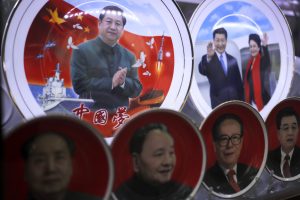On October 14, Chinese leaders attended a celebration event marking the 40th anniversary of the Shenzhen Special Economic Zone (SEZ) in southern China – “a paragon of China’s reform and opening up,” as state news agency Xinhua put it. The event – and its ample coverage in Chinese state media – was an attempt to signal China’s continuing commitment to economic reform and opening at a time when outside analysts see a move toward control and closing off instead.
The Shenzhen SEZ was established in 1980, just after Deng Xiaoping introduced reforms designed to shift China toward a more market-driven economy. At the time, Chinese citizens were being encouraged to start private businesses for the first time since the founding of the People’s Republic, and the government was courting foreign investment. Shenzhen – with its location just across the Pearl River from hyper-capitalist Hong Kong – was to serve as the model for China’s economic opening to the world.
Wednesday’s event, however, was not really about Shenzhen’s history, but about China’s present politics. President and Chinese Communist Party (CCP) leader Xi Jinping attend the gathering himself, signaling his approval of market reforms and commitment to continue the effort. “Reform and opening up is always an ongoing task and will never end,” Xi said, in remarks pointedly highlighted by Xinhua. “Without reform and opening up, China would not be what it is today, nor would it have the prospects for a brighter future.”
As for continuing the reforms, Xi said “China is committed to promoting higher-standard opening up, firmly upholds the multilateral trading system, and will expand market access for foreign capital in broader areas and create a first-class business environment.”
“Expanding and advancing opening up, and promoting reform and development through opening up, is a powerful instrument through which China can achieve continuing progress,” he claimed.
It’s noteworthy, however, that Xi put “adhering to the Party’s leadership” first and foremost on his list of Shenzhen’s “valuable experience.”
Indeed, China under Xi has moved back toward expanded CCP control, undoing some of the reforms implemented under Deng to strengthen the private sector and wean the economy off reliance on state diktat. Even while seeking to encourage entrepreneurs and start-ups, Xi’s CCP has been crystal clear that loyalty to the Party is the ultimate criteria for success. Xi demands more efforts to “unify members of the private sector around the Party.”
Given the push for increased CCP control, most observers greet promises of additional reform with skepticism. There was some optimism in the first years of Xi’s tenure, with the Third Plenum of the CCP’s 18th Central Committee in 2013 laying out potentially transformative rhetoric on economic reforms. Seven years later, however, that communique has mostly been forgotten or dismissed as empty promises.
There has always been tension between the competing calls for reform and opening up and the Party’s underlying need to keep a firm hand on all levers of power – including the economy. All evidence we have suggests Xi is strongly inclined toward the latter side of the balance.
Xi’s ambivalence toward Deng’s signature policy also manifests in his approach to the former leader. At times Xi sees benefit in casting himself as Deng’s heir; at other times, however, he prefers to erase Deng entirely. Xinhua’s main coverage of the Shenzhen celebrations managed not to mention Deng a single time, instead attributing the SEZ’s founding to the wisdom of the CCP Central Committee.
Xi has largely sidelined Deng and his legacy, preferring to elevate himself to a tier of greatness shared only with the PRC’s founding father, Mao Zedong. At the same time, however, Xi does want to affiliate himself with the economic successes generally credited to Deng. As noted China scholar Geremie R. Barmé wrote in 2018, “Shortly after Xi Jinping’s rise, Deng Xiaoping began to disappear. He was disappearing because Xi was claiming some of his most popular moves as his own.”
That leads to occasional embraces of Deng’s legacy, such as this week’s Shenzhen event. Xi even laid flowers at the feet of a Deng statue as part of the festivities. He had visited the same statue, bouquet in hand, soon after taking power in 2012, sparking hopes that he would follow in Deng’s footsteps as a pragmatic, reform-minded leader. Xi still makes similar speeches and symbolic gestures when he wants to convince the Chinese people – and critics abroad – that he is willing and able to advance Deng’s economic reform agenda.
But as Barmé argues, Xi adopts only the style, and not the substance, of Dengist policy: “[H]e crucially overrides aspects of Deng’s legacy that might limit his afflatus and sense of mission.” In other words, Xi wants the credit for success attached to the reform and opening up manta, without actual reform or opening – which would necessarily involve ceding some portion of control.

































